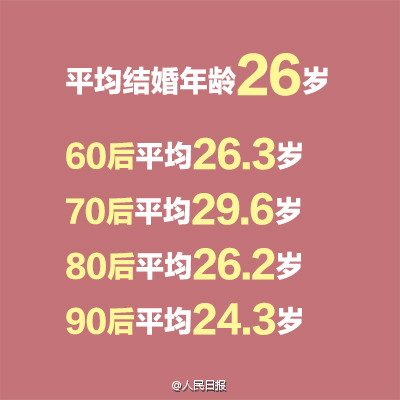Love and Sex in China
Average Chinese Gets Married At 26
A new report points out that the majority of Chinese people get married around the age of 26, and live within traditional family and household structures.
Published
9 years agoon

Although Chinese society has rapidly changed over the past decades, little seems to have changed in when people get married and how the household is managed. A new report points out that the majority of Chinese people get married around the age of 26, and live within traditional family and household structures.
The All China Women’s Federation recently published the “Happy Marriage & Household Report” (中国幸福婚姻家庭调查报告). The report, that contains data and information about various issues within Chinese family structures, points out that the average age of marriage in China is 26. It also writes that over 90% of married women in China tie the knot before the age of 30. The “Happy Marriage & Household Report” results come from a nationwide year-long survey, with 10.000s of questionnaires in ten different provinces, Global Times writes.
More than half (54.3%) of married couples were already acquainted before they developed a relationship, the report says. For the younger generations, the Internet has generally played an important role in getting to know each other.
The report also indicated that the traditional gender roles are still persistent in the majority of Chinese families; the men are breadwinners, while the women are homemakers.
The report’s results became trending topics on Sina Weibo under the hashtags of “China Average Marriage Age is 26” (#我国平均26岁结婚#) and “woman takes care of household, man in charge of earning money” (女方负责家务,男方负责挣钱).
Many Weibo netizens seem unhappy with the report’s results, seemingly feeling pressured into marrying by their parents and society (also read: “Pressured to get married: for the country and for society“).
“I am 27 and still not married,” one netizen says with an unhappy emoticon. Another Weibo user responds: “Marriage is something big, it’s not a game. Age is not important at all. If you compare yourself to the average age of getting married, then also don’t forget to check the average age of getting divorced.” A user called Seven says: “This world does not have an age when you have to get married, just an age when people think you should get married.”
The All China’s Women Federation is a government body established by the Communist Party of China in 1949 to promote “women’s rights”. One user expresses their critique with the federation: “You don’t pay attention to such a grave problem as domestic violence, yet you do have the nerve to pressure us to marry. Such bullsh*t!”
“In my next life I want to be a man,” one female netizen writes: “Because as a woman, you cannot be too fat, you cannot be too skinny, you cannot be a money-grubber, neither a party girl. You have to cook and do the household, you have to be hard-working and gentle, you have to take care of the elders while paying attention to the small kids, you have to make money to support the household. As a man you just have to earn money. They say women are made of water, but I feel women are made of cement – that’s how strong they are.”
– By Manya Koetse
Follow @WhatsOnWeibo
©2015 Whatsonweibo. All rights reserved. Do not reproduce our content without permission – you can contact us at info@whatsonweibo.com.
Manya is the founder and editor-in-chief of What's on Weibo, offering independent analysis of social trends, online media, and digital culture in China for over a decade. Subscribe to gain access to content, including the Weibo Watch newsletter, which provides deeper insights into the China trends that matter. More about Manya at manyakoetse.com or follow on X.

China Media
12-Year-Old Girl from Shandong Gets Infected with HPV: Viral Case Exposes Failures in Protecting Minors
A doctor in Tai’an faced resistance when she tried to report a 12-year-old girl’s HPV case. She then turned to social media instead.
Published
3 months agoon
December 18, 2024
A 12-year-old girl from Shandong was diagnosed with HPV at a local hospital. When a doctor attempted to report the case, she faced resistance. Weibo users are now criticizing how the incident was handled.
Over the past week, there has been significant uproar on Chinese social media regarding how authorities, official channels, and state media in China have handled cases of sexual abuse and rape involving female victims and male perpetrators, often portraying the perpetrators in a way that appears to diminish their culpability.
One earlier case, which we covered here, involved a mentally ill female MA graduate from Shanxi who had been missing for over 13 years. She was eventually found living in the home of a man who had been sexually exploiting her, resulting in at least two children. The initial police report described the situation as the woman being “taken in” or “sheltered” by the man, a phrasing that outraged many netizens for seemingly portraying the man as benevolent, despite his actions potentially constituting rape.
Adding to the outrage, it was later revealed that local authorities and villagers had been aware of the situation for years but failed to intervene or help the woman escape her circumstances.
Currently, another case trending online involves a 12-year-old girl from Tai’an, Shandong, who was admitted to the hospital in Xintai on December 12 after testing positive for HPV.
HPV stands for Human Papillomavirus, a common sexually transmitted infection that can infect both men and women. Over 80% of women experience HPV infection at least once in their lifetime. While most HPV infections clear naturally within two years, some high-risk HPV types can cause serious illness including cancer.
“How can you be sure she was sexually assaulted?”
The 12-year-old girl in question had initially sought treatment for pelvic inflammatory disease, but upon review, her doctor discovered that she had been previously treated for vaginitis six months earlier. During further discussions with the girl, the doctor learned she had been sexually active with a boy five years her senior and was no longer attending school.
Given that the age of consent in China is 14 years old, the doctor sought to report the case to authorities. However, this effort was reportedly met with resistance from the hospital’s medical department, where she was allegedly questioned: “How can you be sure she was sexually assaulted?”
When attempts to escalate the case to the women’s federation and health commission went unanswered, the doctor turned to a blogger she knew (@反射弧超长星人影九) for help in raising awareness.
The blogger shared the story on Weibo but failed to receive a response through private messages from the Tai’an Police. They then contacted a police-affiliated Weibo channel they were familiar with, which eventually succeeded in alerting the Shandong police, prompting the formation of an investigation team.
As a result, on December 16, the 17-year-old boy was arrested and is now facing legal criminal measures.
According to Morning News (@新闻晨报), the boy in question is the 17-year-old Li (李某某), who had been in contact with the girl through the internet since May of 2024 after which they reportedly “developed a romantic relationship” and had “sexual relations.”
Meanwhile, fearing for her job, the doctor reportedly convinced the blogger to delete or privatize the posts. The blogger was also contacted by the hospital, which had somehow obtained the blogger’s phone number, asking for the post to be taken down. Despite this, the case had already gone viral.
The blogger, meanwhile, expressed frustration after the case gained widespread media traction, accusing others of sharing it simply to generate traffic. They argued that once the police had intervened, their goal had been achieved.
But the case goes beyond this specific story alone, and sparked broader criticisms on Chinese social media. Netizens have pointed out systemic failures that did not protect the girl, including the child’s parents, her school, and the hospital’s medical department, all of whom appeared to have ignored or silenced the issue. As WeChat blogging account Xinwenge wrote: “They all tacitly colluded.”
Xinwenge also referenced another case from 2020 involving a minor in Dongguang, Liaoning, who was raped and subsequently underwent an abortion. After the girl’s mother reported the incident to the police, the procuratorate discovered that a hospital outpatient department had performed the abortion but failed to report it as required by law. The procuratorate notified the health bureau, which fined the hospital 20,000 yuan ($2745) and revoked the department’s license.
Didn’t the hospital in Tai’an also violate mandatory reporting requirements? Additionally, why did the school allow a 12-year-old girl to drop out of the compulsory education programme?
“This is not a “boyfriend” or a “romantic relationship.””
The media reporting surrounding this case also triggered anger, as it failed to accurately phrase the incident as involving a raped minor, instead describing it as a girl having ‘sexual relations’ with a much older ‘boyfriend.’
Under Chinese law, engaging in sexual activity with someone under 14, regardless of their perceived willingness, is considered statutory rape. A 12-year-old is legally unable to give consent to sexual activity.
“The [Weibo] hashtag should not be “12-Year-Old Infected with HPV, 17-Year-Old Boyfriend Arrested” (#12岁女孩感染HPV其17岁男友被抓#); it should instead be “17-Year-Old Boy Sexually Assaulted 12-Year-Old, Causing Her to Become Infected” (#17岁男孩性侵12岁女孩致其感染#).”
Another blogger wrote: “First, we had the MA graduate from Shanxi who was forced into marriage and having kids, and it was called “being sheltered.” Now, we have a little girl from Shandong being raped and contracting HPV, and it was called “having a boyfriend.” A twelve-year-old is just a child, a sixth-grader in elementary school, who had been sexually active for over six months. This is not a “boyfriend” or a “romantic relationship.” The proper way to say it is that a 17-year-old male lured and raped a 12-year-old girl, infecting her with HPV.”
By now, the case has garnered widespread attention. The hashtag “12-Year-Old Infected with HPV, 17-Year-Old Boyfriend Arrested” (#12岁女孩感染HPV其17岁男友被抓#) has been viewed over 160 million times on Weibo, while the hashtag “Official Notification on 12-Year-Old Infected with HPV” (#官方通报12岁女孩感染hpv#) has received over 90 million clicks.
Besides the outrage over the individuals and institutions that tried to suppress the story, this incident has also sparked a broader discussion about the lack of adequate and timely sexual education for minors in Chinese schools. Liu Wenli (刘文利), an expert in children’s sexual education, argued on Weibo that both parents and schools play critical roles in teaching children about sex, their bodies, personal boundaries, and the risks of engaging with strangers online.
“Protecting children goes beyond shielding them from HPV infection,” Liu writes. “It means safeguarding them from all forms of harm. Sexual education is an essential part of this process, ensuring every child’s healthy and safe development.”
Many netizens discussing this case have expressed hope that the female doctor who brought the issue to light will not face repercussions or lose her job. They have praised her for exposing the incident and pursuing justice for the girl, alongside the efforts of those on Weibo who helped amplify the story.
The blogger who played a key role in exposing the story recently wrote: “I sure hope the authorities will give an award to the female doctor for reported this case in accordance with the law.” For some, the doctor is nothing short of a hero: “This doctor truly is my role model.”
By Manya Koetse, with contributions by Miranda Barnes
(follow on X, LinkedIn, or Instagram)
Spotted a mistake or want to add something? Please let us know in comments below or email us. First-time commenters, please be patient – we will have to manually approve your comment before it appears.
©2024 Whatsonweibo. All rights reserved. Do not reproduce our content without permission – you can contact us at info@whatsonweibo.com.
China Books & Literature
The Price of Writing Smut: Inside China’s Crackdown on Erotic Fiction
The crackdown on Haitang Literature City has led to greater awareness of it, with Chinese netizens now paying closer attention to the repression of erotic content and the struggles faced by its authors.
Published
4 months agoon
November 3, 2024By
Ruixin Zhang
A recent crackdown on Chinese authors writing erotic webnovels has sparked increased online conversations about the Haitang Literature ‘Flower Market’ subculture, the challenges faced by prominent online smut writers, and the evolving regulations surrounding digital erotica in China. But how serious is the “crime” of writing explicit fiction China today?
You might have heard of haitang (海棠), the Chinese crabapple flower, but chances are you haven’t come across Haitang Literature City (海棠文学城)—and you’re not alone. Most people in China haven’t heard of it either. Haitang Literature City is a Taiwan-based, Chinese-language website dedicated primarily to female-oriented smut fiction, with numerous contributors from mainland China.
‘Smut fiction’ is a genre focused on explicit, sexual content and themes. Stories in this genre often emphasize the physical relationships between characters, with detailed erotic scenes. On Haitang Literature City, the most popular category is BL (Boys’ Love), which centers on romantic and erotic relationships between male characters and is written mainly for a female audience (read more here). The site also features a variety of heterosexual and lesbian stories, ranging from straightforwardly explicit to more unusual narratives. One consistent aspect across the site: most of the authors are women, writing primarily for a female readership.

Example covers of online erotica
Haitang Literature City, known as the ‘Flower Market’ (花市) by its users, has stayed relatively underground within certain reading circles. Recently, however, a help post on Weibo has brought this hidden flower market into the spotlight, sparking considerable buzz online.
The post came from a user named “Rain Painted on a Sunny Day” (@晴天画的雨), the younger sister of the Haitang author known as “Yunjian” (云间, “Between the Clouds”). On October 16, she revealed that Yunjian had been detained since June 20 and is only allowed visits from her lawyer. The arrest notice she shared cites the charge: “suspected of producing and disseminating pornographic materials for profit” (“传播淫秽物品牟利罪”).
Yunjian, a prominent author on Haitang, has been writing for over a decade, producing tens of millions of words. Her detention not only forces her to forfeit all the royalties earned over the past ten years—now labeled “illicit earnings”—but also means she faces time in prison. While “Rain Painted on a Sunny Day” acknowledged her sister’s “offense” in the post, she explained that the resulting heavy fines have left their family deeply in debt, struggling to make ends meet. After the post went up, many of Yunjian’s readers expressed heartbreak over her situation and began donating to help.
Meanwhile, Haitang Literature City, once part of an underground culture, has been brought into the spotlight. “What is Haitang Literature City? Why are the authors on this site charged with the crime of producing and distributing obscene materials? Can someone explain? It feels like a completely different world—I truly have no idea about any of this,” one Weibo user wrote. Ironically, the crackdown on the site has led to greater awareness of it, with Chinese netizens now paying closer attention to the long-standing repression of erotic content authors and the ongoing struggles they face.
MONTHS OF CRACKDOWN
“They’re back to where they started, with nothing to their name”
The crackdown on authors of explicit content from Haitang Literature City began earlier in 2024. Blogger @LXC (@洛曐曟LXC), who has been documenting these events, described how police in Anhui Province launched a cross-provincial operation in June. On June 20, they arrested Haitang distributors along with several of its most successful authors. The Haitang site quickly shut down the next day, citing maintenance. The platform remained offline for several days.
During this shutdown, many authors aware of the arrests requested that their published work be hidden. As a result, Haitang locked down all site content, allowing authors to unblock their works only upon request.
Most of the first batch of arrested authors were released around June 20, with some warning others against writing on Haitang due to the high risks involved. However, this information circulated only within a small group, so few were aware of it. Authors who had earned larger sums from their writing were unable to arrange their release and remained in custody.
How did Haitang respond? Despite being aware of the arrests, the site apparently chose not to inform other authors of the risks, possibly prioritizing profits and readership. Blogger @LXC expressed her frustration with Haitang for misleading authors who were completely unaware of the situation, as well as others who had heard unverified rumors, into unlocking their columns for subscriptions. Seeing this, several smaller authors followed suit and unlocked their works as well.
From late July to early August, another group of authors was summoned by the police. Nearly all of this second batch of arrested authors were among those who had reapplied to unblock their columns after the site had reopened. LXC suggested that the site’s mismanagement and silence about the initial arrests were responsible for these authors getting into trouble.
Yunjian remains one of the authors detained since the initial crackdown in June and has yet to be released. Alongside her, many lesser-known authors are also struggling, with many relying on their writing on Haitang to make ends meet. Among them are stay-at-home moms, low-income students, and young women from rural areas who cannot find work. After all this upheaval, their situations have only worsened, and they are likely in even more dire straits than the more well-known authors.
“To me, it’s straightforward,” @LXC wrote: “These women earned money and, as a result, improved their previously poor lives. Now that money is being taken away from them, they’re back to where they started, with nothing to their name.”
A DECADE-LONG SURVIVAL GAME
“Censorship has reached absurd levels”
This isn’t the first time Chinese online smut writers have been targeted under the country’s strict censorship laws governing pornographic content. Since China launched its “Clean Internet Campaign” in 2014, many smut writers and online fiction platforms have faced consequences. In June 2015, author Ding Yi (丁一) received a suspended three-and-a-half-year sentence for her “explicit” novels on the platform Jinjiang Literature City (晋江文学城). Another writer, Mo Xiang Tong Xiu (墨香铜臭), known for her novel The Untamed and its TV adaptation, was sentenced to three years on “illegal publishing” charges. Although her case didn’t specifically involve “producing and disseminating pornographic materials for profit,” her arrest was still part of the broader anti-pornography campaign due to the erotic themes in her work.
Another well-known BL writer, Tian Yi (天一), faced an even harsher punishment. In 2018, she was sentenced to ten and a half years in prison for her novel Absolute Domination, which included erotic depictions of gay relationships and had earned her around 150,000 yuan ($21,000) from print sales. A young woman who assisted with typesetting was also implicated—she received a four-year sentence and a 10,000-yuan ($1,400) fine for her 3,100-yuan ($430) part-time payment.
While authors have faced relentless crackdowns, websites themselves have also struggled to survive. Jinjiang Literature City (晋江文学城)—a major online fiction platform known for hosting works with mature content—has been shut down and pressured into strict content checks, with some smaller sites shut down entirely. After multiple shutdowns and rounds of scrutiny, Jinjiang became almost hyper-vigilant, enforcing its self-censorship to an extreme. Now, any sensitive terms are automatically replaced with “口口,” as the site pushes to remove anything that might be seen as explicit by the authorities.
Many netizens have pointed out that the “content review guidelines” (link) of the Jinjiang platform are ironically hilarious: “Any depiction below the neck involving intimacy, body parts, sexual acts, sexual thoughts or fantasies, sexual organs, or excessive violence is considered explicit and thus prohibited,” it states. “Even if it’s less direct and more subtle, if the scenes are too lengthy or portray the entire process, they are also counted as explicit content.” Netizens joke that as long as the reviewers think you’re being suggestive, it’s a off limits—censorship has reached absurd levels.
However, readers’ demand for pornographic works hasn’t diminished at all in this decade-long, intense survival game. A quick search for names like “Tian Yi,” “Yunjian,” or “Mr. Shenhai” on Weibo still reveals hundreds, if not thousands, of people actively seeking and sharing resources for their novels.
THE PRICE OF EROTIC CONTENT IN CHINA
“There are people who commit crimes that truly harm others who don’t face such severe sentences”
How serious is the “crime” of writing online smut in China? While Yunjian has yet to be tried or sentenced, online discussions suggest she may face severe punishment. Her royalties over the past decade exceed 250,000 yuan ($35,000), potentially classifying her case as a particularly serious offense under Chinese law for “producing and disseminating pornographic materials for profit,” due to its perceived negative impact on youth and potential to corrupt social morals. This could result in fines of one to five times her earnings and likely a prison sentence of over ten years.
Recent cases indicate similar outcomes: on October 17, a Weibo account called @HuaiBeiLiXinWrongfulCase (@淮北李鑫冤案) posted a plea, revealing that author Li Xin (李鑫), who co-wrote the historical fantasy Six Dynasties with Luo Sen (罗森), was detained on the same charge after earning 300,000 yuan ($42,118) in royalties, which led to a ten-year prison sentence. As a similarly prominent author, Yunjian may face even harsher penalties and potentially an even longer prison term.
🌟 Attention!
For 11 years, What’s on Weibo has remained a 100% independent blog, fueled by our passion to write about China’s digital culture and online trends. Over a year ago, we introduced a soft paywall to ensure the sustainability of this platform. We’re grateful to all readers who’ve subscribed since 2022. Your support has been invaluable. But we need more subscribers to continue our work. If you appreciate our content and want to support independent coverage on digital China, please become a subscriber today. Your support keeps What’s on Weibo going strong!
Can writing smut really lead to such severe sentences? Some netizens have questioned this, speculating that the heavy penalties might actually be due to alleged money laundering or tax evasion. However, these theories were quickly dismissed: the royalties earned by Haitang authors come from legitimate payments made by actual readers, making money laundering unlikely. As for tax evasion, Haitang is a Taiwanese website and isn’t required to pay taxes to the mainland government. Even if mainland authors were guilty of tax evasion, they would likely just be required to pay back taxes rather than face prison time. Relying on these conspiracy theories to justify harsh penalties seems like a way to avoid addressing deeper issues within the current legal system.
Punishment can be actually be heavy based on various other factors. Some netizens have pointed out that the law states that making a profit of 250,000 yuan ($35,000) or achieving over 250,000 clicks is considered an particularly serious offense, potentially leading to a prison sentence of over ten years. But for online writers, especially prominent authors, reaching 250,000 clicks is relatively easy, which put them significantly at risk for for receiving heavy sentencing.
Moreover, the criteria for determining what actually constitutes ‘pornographic materials’ are quite vague. The family of the detained author Li Xin pointed out on Weibo that Article 367 of the Criminal Law specifies that literary and artistic works with artistic value, even if they contain erotic elements, should not be classified as pornographic. While Li Xin’s novels do feature erotic content, they also include a historical, cultural, military, economic, and social insights, leading to a variety of discussions among online readers.
“If this were truly an obscene novel overall, where would such rich discussions have come from?” The family wondered: “While the book does contain some unapologetic depictions of [sexual] relations, they serve only as parts of the story’s progression and character development. Could this limited content really lead to the moral corruption of ordinary people?”
The biggest controversy here centers on the stark contrast between the punishment for writing smut and for committing far more severe crimes. “Ten years is way too long; there are people who commit crimes that truly harm others who don’t face such severe sentences,” one netizen lamented on Weibo in response to Li Xin’s case.
This frustration resonates widely online. According to Chinese law, sentences for rape usually range from 3 to 10 years, with only exceptionally severe cases—such as those involving minors or resulting in serious injury or death—receiving more than ten years.
Angry netizens complain that recent court decisions on heinous crimes like sexual assault, voyeurism, and domestic violence often result in lighter sentences than what Yunjian is facing. Author @LuoSaiEr (@罗塞迩) highlighted a recent case of a man who recorded 75,000 videos for profit over five years and received only a one-year prison sentence. The stark contrast between the punishment for a smut writer and for actual sexual offenders, regardless of the legal complexities, is hard for the public to accept.
In China’s legal circles, there’s a growing belief that the laws around “producing and disseminating pornographic materials for profit” are seriously outdated, with penalties that often don’t align with the actual harm caused to society. Ever since the Tianyi case, legal experts have pointed out that the sentences don’t reflect the realities of today’s world.
Yet for ordinary people who now struggle to find erotic content, discussing legal reform feels almost pointless. With pop-up ads and QR codes linking to porn sites, hidden cameras in hotel rooms, and private videos being sold in group chats, it’s frustrating to see the law come down so hard on smut writers—who have no real victims—while many actual sex offenders walk free. As one netizen put it, this situation “shames the judiciary and makes it look disgraceful.”
Four months later, Yunjian remains in detention. With the support of donations from concerned netizens, her family has overcome their worst financial struggles and no longer accepts contributions. But for them—and for every writer and reader affected by this case—the fight for justice and their right to create still feels like a long, uncertain road ahead.
Update December 2024 (taken from our Newsletter):
We wanted to provide some updates about the erotic content writers we discussed previously, as their final sentencing results were announced recently. One of the authors convicted is Yunjian (云间), one of the more prominent writers of these sexually explicit web novels. As reported by Lianhe Zaobao, she was sentenced to 4 years and 6 months in prison for profiting from illegal activities. Some authors who were unable to gather funds to return illicit gains faced even longer sentences.
On Weibo, some people are outraged over the severity of the punishment, especially since Yunjian reportedly earned no more than 2 million RMB ($275,000) over several years of publishing. However, there are also some who defend the state’s crackdown on online “obscenities,” arguing that distributing such explicit content is a serious crime.
One commenter on Weibo wrote: “I don’t want to describe works filled with hope as ‘obscene materials’ (淫秽物品). I don’t want to define the hard-earned income from creative efforts as ‘illegal earnings’ (赃款). I don’t want to reduce the warm and joyful exchanges between readers and authors to the act of ‘distributing obscene materials’ (传播淫秽物品). This is the most degrading and evil form of humiliation.”
By Ruixin Zhang
Independently covering digital China for over a decade. Like what we do? Support us and get the story behind the hashtag by subscribing:
edited for clarity by Manya Koetse
Spotted a mistake or want to add something? Please let us know in comments below or email us. First-time commenters, please be patient – we will have to manually approve your comment before it appears.
©2024 Whatsonweibo. All rights reserved. Do not reproduce our content without permission – you can contact us at info@whatsonweibo.com.
What’s on Weibo Chapters
Subscribe

“Li Jingjing Was Here”: Chinese Netizens React to Rumors of “Chinese Soldiers” in Russia

How Ne Zha 2’s Shen Gongbao Became Known as the Ultimate “Small-Town Swot”

Beyond the Box Office: What’s Behind Ne Zha 2’s Success?

Ne Zha 2: Making Donghua Great Again

The Unstoppable Success of Ne Zha 2: Breaking Global Records and Sparking Debate on Chinese Social Media

Our Picks: Top 10 Chinese Buzzwords and Phrases of 2024 Explained

“Dear Li Hua”: The TikTok/Xiaohongshu Honeymoon Explained

Why Chinese Hit Movie “Her Story” is ‘Good Stuff’: Stirring Controversy and Celebrating Female Perspectives

Chiung Yao’s Suicide Farewell Letter: An English Translation

Breaking the Taboo: China’s Sanitary Pad Controversy Sparks Demand for Change

12-Year-Old Girl from Shandong Gets Infected with HPV: Viral Case Exposes Failures in Protecting Minors

Weibo Watch: Christmas in China Is Everywhere and Nowhere

Weibo Watch: A New Chapter

Weibo Watch: China’s Online Feminism Is Everywhere

Story of Chinese Female MA Graduate Going Missing for 13 Years Sparks Online Storm
Get in touch
Would you like to become a contributor, or do you have any tips or suggestions? Get in touch here!
Popular Reads
-

 China Insight10 months ago
China Insight10 months agoThe Tragic Story of “Fat Cat”: How a Chinese Gamer’s Suicide Went Viral
-

 China Music11 months ago
China Music11 months agoThe Chinese Viral TikTok Song Explained (No, It’s Not About Samsung)
-

 China Insight12 months ago
China Insight12 months agoThe ‘Two Sessions’ Suggestions: Six Proposals Raising Online Discussions
-

 China Digital9 months ago
China Digital9 months agoChina’s 2024 Gaokao Triggers Online Discussions on AI







